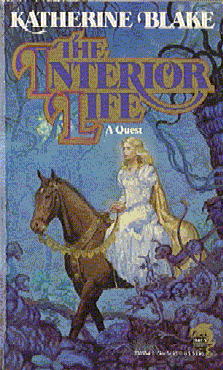The Interior Life (1990) is really not like anything else. It was published by Baen in what seems to have been a fit of absentmindedness, as Baen are generally really good at branding, and you could go a long way without finding sometime less typically Baen than this. The Interior Life is a fantasy novel about an ordinary American housewife who begins to hear voices in her head from a fantasy world. She never goes to the fantasy world and nobody from the fantasy world ever comes to this world. The story passes seamlessly between Sue in this world joining the PTA and painting the kitchen to Lady Amalia in the fantasy world battling the forces of Darkness. The weird thing is that this works. The stories reinforce each other, they drag you along by ratcheting, you want to follow both halves of what is happening, and the mundane details of Sue’s life are not only enhanced by the fantasy in her head but made fascinating by it.
I expect that if you did a survey people wouldn’t say that they valued masculine virtues above feminine virtues, and likewise they wouldn’t say that the depressing is inherently better than the uplifting. Nevertheless, in written fiction this does seem to be people’s unconscious bias. There are more downer books than heartwarming ones, and those heartwarming ones there are get scoffed at and diminished. Nobody calls Nineteen Eighty Four a “guilty pleasure.” Similarly there are a lot of books in which characters people go to the library for tech support and very few where they go to the library for cookbooks. The Interior Life is grounded in the feminine virtues of nurturing and support, and it takes this seriously in a way that a lot of feminist SF and fantasy doesn’t quite manage. From Tehanu to Thendara House there’s a self-consciousness in the way we’re told these things are important while being shown that they’re not. Heydt avoids that entirely by writing about them with a heartfelt sincerity. It’s also a cheerful positive book—not just a book with a happy ending, but a resolutely upbeat book. It’s a really enjoyable read. No wonder it sank without trace.
The Demouria portion of the story would, on its own, be a fairly standard worldsaving fantasy. The Sue portion alone wouldn’t even be a story. It’s odd that there are so few stories about people cleaning their house and joining the PTA and organizing dinner parties for their husband’s work colleagues and helping their kids with their homework, even in mainstream fiction. There are stories about people who escape from that, and there are stories about people who do that effortlessly in the background of having adventures, and there are stories about people, men mostly, who suddenly have to do it and notice that it’s hard work, but this is the only book I know that focuses on keeping house in this way. I like that it isn’t about Sue abandoning Fred and her boring life but rather getting on top of her life and making it one that she likes. This could have been published as a mainstream novel of beating depression by having an active fantasy life—and yet, it’s a fantasy novel too. If the fantasy helps save Sue, Sue also helps save Demouria. It’s an odd combination, and yet it’s very effective.
The narrative switches between worlds without missing a beat, sometimes several times in the same paragraph—by the time you’re switching between the PTA tea-party and the coronation you don’t even notice that it’s odd. Heydt has said that she intended to use different typefaces to represent the different viewpoints, but this didn’t work out—fortunately it wasn’t necessary, all the cues are there and it is never hard to follow.
The story is very firmly set in the late eighties: the forward-thinking PTA are considering building a computer lab for the school; computers are new and expensive and weird; CDs are just getting started, most people still listen to records. The medieval fantasy world has not dated in the same way.
I tend to get into the mood to pick this up when my kitchen has got out of control—and by the time I finish it, I generally have it back in control. As well as being a nice, if relatively standard, fantasy quest, it makes me feel good about housework. I read it in the first place because it was given to me by a friend because Heydt was a friend on usenet. (She published this as Blake for odd reasons that don’t matter, she later published other things under her own name.) I never saw a copy new, and I seldom see a copy around used—and when I do I grab it to give to someone. It’s a pity that the Tiptree Award for works of gender relevance wasn’t instituted until 1992, because this book would have been an interesting and thought-provoking nominee.
Jo Walton is a science fiction and fantasy writer. She’s published eight novels, most recently Half a Crown and Lifelode, and two poetry collections. She reads a lot, and blogs about it here regularly. She comes from Wales but lives in Montreal where the food and books are more varied.










